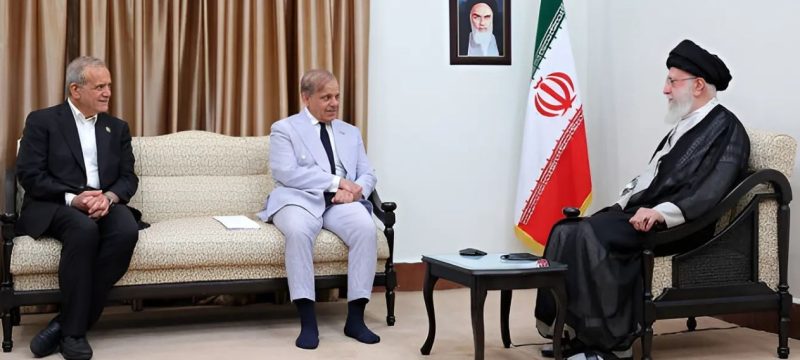Prime Minister Shehbaz Sharif has praised the strengthening relationship between Pakistan and Iran, affirming that both nations have consistently supported one another and will continue to collaborate on key issues facing the Muslim world.
In an exclusive interview with Iran’s state news agency IRNA ahead of his official visit to Tehran, the premier expressed appreciation for Iran’s diplomatic backing during heightened tensions between Pakistan and India. He emphasized the need for greater regional cooperation and deeper economic ties between Islamabad and Tehran.
Read more: Oil Prices Spike Amid Rising Tensions Over Potential Israeli Strike on Iran
“Iran and Pakistan have always stood together in difficult times. Our partnership is now stronger and more stable than ever,” he stated.
Remembering his meetings with the late Iranian President Ebrahim Raisi, PM Shehbaz praised him as a visionary leader. “President Raisi had exceptional foresight. I fondly recall hosting him in Pakistan shortly before his tragic passing. We agreed to strengthen our bilateral relationship, and I’m proud to say real progress has been made,” he said.
The prime minister’s visit to Iran comes at the invitation of President Masoud Pezeshkian. He said his main purpose was to convey gratitude for Iran’s support and offer to mediate during the Pakistan-India conflict. He reiterated that India initiated the conflict, which was met with a firm yet restrained response from Pakistan in accordance with international humanitarian law.
Though India declined Iran’s mediation, PM Shehbaz thanked Tehran for its genuine efforts to ease tensions. He also acknowledged the role of President Pezeshkian and Foreign Minister Abbas Araqchi in promoting peace, noting that Iran’s diplomatic efforts reflect maturity and strategic wisdom.
Sharif lauded Araqchi’s diplomatic expertise, describing him as a seasoned leader adept at managing regional complexities. He also reaffirmed Pakistan’s strong condemnation of Israel’s actions in Gaza, stressing that both Islamabad and Tehran stand united in supporting the Palestinian cause and opposing what he described as a “genocidal war.”
On economic matters, PM Shehbaz highlighted the shared 900-kilometre border between Iran and Pakistan, underlining their interconnected futures. He revealed that multiple agreements have been signed to promote joint development, particularly in border regions like Pakistan’s Balochistan and Iran’s Sistan-Baluchestan.
“Our bilateral trade currently stands at around $3 billion, but our goal is to reach $10 billion. We are working on a free trade agreement and are committed to long-term economic cooperation,” he added.
Addressing Iran’s nuclear programme, PM Shehbaz reaffirmed Pakistan’s support for Tehran’s peaceful nuclear ambitions and stressed the need to revive the Joint Comprehensive Plan of Action (JCPOA). He emphasized that diplomacy remains the only path to lasting peace, expressing confidence in Iran’s leadership and optimism about ongoing indirect talks with the United States.
Finally, he highlighted the unresolved crises in Kashmir and Palestine, calling them the “two longest-standing tragedies of the Muslim world.” He insisted that true regional peace and justice cannot be achieved until both conflicts are resolved in line with the will of the affected populations.





